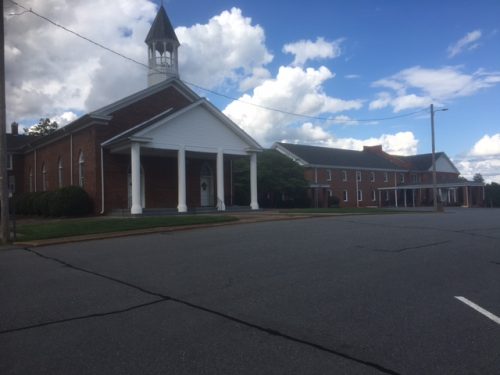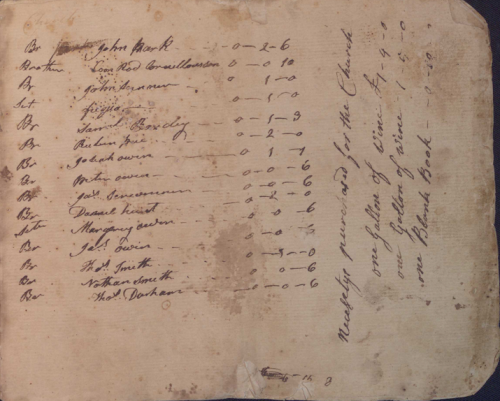Having begun publication 60 years after the American Revolution, the Biblical Recorder still had that momentous event as a fresh memory. Veterans of the fight for independence were elderly men in church congregations across the state of North Carolina. So it is not surprising that references to the war often occurred in its print but this story tells of the impact the Revolution had locally and on one old Baptist church in particular.
The March 7, 1840 edition of the Biblical Recorder carried an article on Stephen Gano, the pastor of the First Baptist Church in Providence, Rhode Island, started by Roger Williams as he fled the control of the Puritans in Boston. Williams sought refuge in a spot undesirable to the Puritans where the Native Americans welcomed him and his independent views. Having left the Puritan church, Williams self-identified as a Baptist and later yet another affiliation (he was somewhat fluid in his church practice but determined in not being told how to worship). The church survived and remains the historic first Baptist church in America, noted for its origins as a representation of separation of church and state (the Puritans were the government in Massachusetts Colony, ironic since they had fled the state church in England) and also its lovely architecture. The small state of Rhode Island was born from this Church History event, its capital still called Providence as Williams found it to be in his life.
Previously in the American Revolution, a 17-year-old Dr. Stephen Gano, already a medical doctor, served in the army as a physician’s assistance until he was marooned, captured by the British and held on a prison ship near the end of the war. After practicing medicine, he turned to ministry and became a missionary to the western frontier in Ohio where he is credited with starting the first Baptist church there before taking the pastorate in Providence. He came by his missionary zeal honestly.

Stephen Gano had a strong connection to North Carolina Baptists through his father John Gano and the Jersey Baptist Church in present day Davidson County. Reverend John Gano, also often mentioned in the Biblical Recorder, would later leave his own mark in history as the Pastor of First Baptist Church in New York City and the chaplain for General George Washington and his troops in the Revolution; he was present at Valley Forge and the Crossing of the Delaware that changed the course of the war. (Some also believe he baptized Washington as an adult by full immersion but this is unsubstantiated by any documents.) John Gano was so respected in the colonial Carolinas that Richard Furman, for whom the university is named, named not one but two of his sons John Gano Furman.
In the 1750s John Gano had been sent as a missionary from New Jersey to a small congregation of fellow Jerseyans in the piedmont of North Carolina who needed a pastor. Jersey settlement was in a remote corner of present day Davidson County near the Trading Ford on the Yadkin River. After the trouble with the local Native Americans deeply troubled Gano’s wife, they relocated back north shortly before their son Stephen was born. The Jersey Baptist Church then struggled through the Regulators Movement when a prominent deacon (and innovative mill operator who famously devised a way to set up his machines to bore a gun overnight) named Benjamin Merrill was unjustly executed for treason by the British colonial governor William Tryon.

Baptist churches were often divided in the Revolution as churches had both Patriots and Loyalists in their pews However, their minutes in the holdings of the Wake Forest University Special Collections (Jersey Baptist Church (Davidson County, N.C.) Records (MS761)) show them both discussing church discipline for a soldier who had fallen out of church attendance while another congregation offered forgiveness to its members for fighting in the rebellion. The small Jersey Baptist Church could not survive all these upheavals and ceased to meet as the Revolution heated up. It was the perfect storm that they could not weather.
However, its members continued to worship safely with other churches, including the historic Fork Baptist Church, the oldest in existence in present day Davie County. Remarkably, in 1784 the believers in Jersey Settlement reorganized their church, with that first meeting captured in a small leather journal in the holdings of the Special Collections. It lists the fifteen names of the new charter members of the Jersey Baptist Church and three items of business – to reimburse the brother who provided the journal, to purchase a gallon of wine and thirdly, yes, to purchase another gallon of wine. They were celebrating a revival of their church and preparing for a robust Communion.
With the war over and a new normal in a new nation emerging, Jersey Baptist Church grew again into a thriving country church that still meets today. John Gano, recently widowed, frequently visited North Carolina and married a local war widow from the pioneer Bryan family; they became missionaries to Kentucky, following the trail of new settlers west of the mountains. Migration was familiar to the Ganos who had a family heritage as the descendants of Huguenots that escaped persecution to America (and provides distant cousin status to this author through that shared lineage). Gano descendants later included several generals on both sides of the Civil War and business mogul Howard Hughes (whose mother was a Gano). John Gano’s family descendants also included the Wright Brothers (who made their way to North Carolina for a soft landing), providing 20 the century aviation fame in a family already known for its courage to break boundaries and make history, captured on the old pages of the Biblical Recorder.

11 Comments on ‘The American Revolution, The Biblical Recorder and a Country Church’
This is fascinating, Marcia. Thank you for sharing!
Wonderful research and interesting person. Thanks, Marcia!
Wonderful story and research Marcia!
Wonderful write-up. So interesting to learn about this history. Thanks for sharing!
This is a wonderful story Marcia. I love how you connected all of these interesting pieces of history together.
Thanks, Marcia, for finding and sharing these in-depth stories–they remind us how important these historical sources, like the Biblical Recorder, are!
Your contributions bring our collections to life, and this post is no exception! Thank you for drawing us into the history.
Fascinating story! You have really brought this history to life!
This is a cool connection of these archives, the American Revolution, and your personal ancestry — love it! Thanks for writing it up and sharing it.
Congratulations for the valuable research and turning the findings into a clear and interesting history.
Thank you for sharing your research!